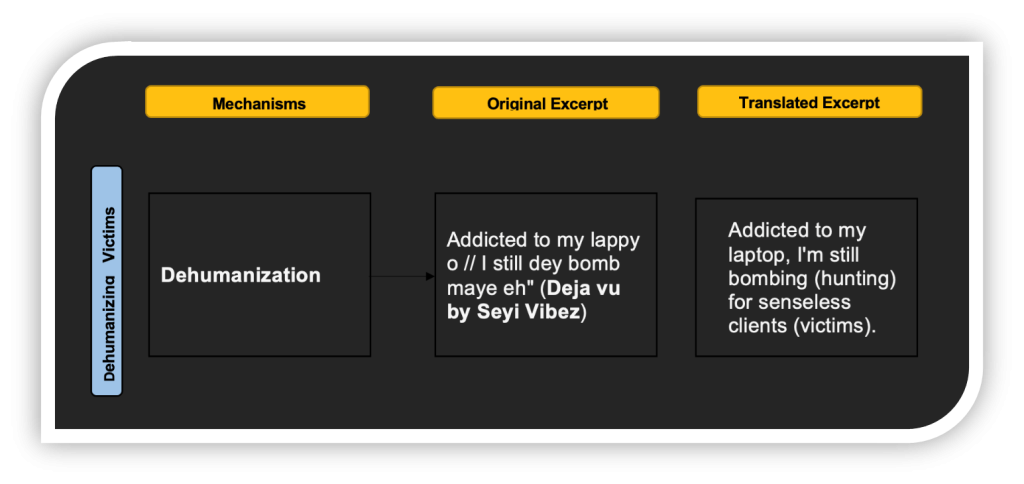Nigerian hip-hop artists have a growing international audience and are glamourising internet scammers, writes Suleman Lazarus.
Internet fraud has become a significant global concern, and Nigeria has emerged as a scamming superpower, with groups sending scam emails to millions of people around the world.
One group, the Yahoo Boys, whose name derives from the scammers’ domination of Yahoo email addresses, apps, and instant messaging services in the mid-2000s, have links to Nigerian musicians and the music industry, enabling them to launder their ill-gotten gains internationally.
Global Influence of Nigerian hip-hop
Nigerian hip-hop has a global influence that extends beyond Nigeria and the Nigerian diaspora. Artists such as Davido, Wizkid, and Burna Boy, have achieved remarkable success, including selling out the O2 Arena in London – Davido in 2019 and 2022, Wizkid in 2018, 2019, and 2021, and Burna Boy in 2021. These musicians have performed in huge venues in Toronto, Los Angeles, and Brooklyn; other Nigerian singers, such as Olamide, have achieved a similar status. The world of music is a powerful influencer, and as recent research reveals, its impact stretches far beyond the realms of entertainment into the very fabric of society and culture.
Music is a powerful tool
Music has the power to move us and stir up emotions. It’s incredible how a simple melody or beat can make us feel alive and energised or bring tears to our eyes.
This power can be used to make singers massive stars or promote ideas and there is a fine line between singing about what is ‘going on’ and endorsement of activities.
Recent research focused on thirty-three Nigerian hip-hop songs that have captivated audiences from June 2017 to July 2023, show that they depict and rationalise online fraud and dehumanise victims.
The lyrics of hip-hop music reveal diverse motives that provide justifications for the activities of internet fraudsters. While it’s crucial to clarify that music lyrics themselves do not cause crime, the influence of celebrity is undeniable. Lyrics offer rich vocabularies that rationalise illicit actions and foster a nuanced understanding and appreciation among listeners. This influence can shape how music listeners perceive and react to cybercriminals and cybercrime victimisation. Specifically, as shown in the figure below, some songs glamorise offenders and depict these victims in a dehumanising light, exacerbating and mocking their already challenging circumstances.
Such portrayals can be characterised as passive dehumanisation, marked by a conspicuous absence of empathy while portraying internet fraudsters positively. It is, therefore, critical to underscore the global influence of musicians whose songs downplay the plight of online fraud victims and inadvertently encourage unintended endorsements.
Inclusion in a song or enjoying a song does not always imply an endorsement. The 65th United States Secretary of State, Collin Powell, unknowingly sang and danced to a song that glorifies internet fraud and scammers. Despite this caveat, Nigerian hip-hop music has evolved into a dynamic platform for cultivating fresh imaginaries previously unexplored in cultural and cyber practices associated with online fraud. It has become an active site for portraying these practices positively instead of condemning them.
Con artists and music artists as birds of the feather
According to the media and academic research, some Nigerian hip-hop musicians are allegedly involved in online fraud and receive support from internet fraudsters. For instance, the song “Oshozondi“ by DJ Sidez and Slimecase featuring Masta T references high-profile Yahoo Boys, such as Hushpuppi in their music. A Nigerian rapper, Sauce Kid, was apprehended in the United States for committing online fraud. Hip-hop singer Dammy Krane was detained in Miami for cyber fraud before boarding a private aircraft, further strengthening the ties between Yahoo Boys and musicians. In 2019, the Economic and Financial Crime Commission detained musician Naira Marley on online fraud allegations. Based on the available evidence, it becomes evident that some con artists and music artists may not necessarily fall into distinct categories.
Nigerian hip-hop has emerged as a potent force in the global soundscape, transcending borders with artists like Davido and Burna Boy commanding international stages and harvesting global awards. However, a nuanced examination reveals a complex narrative within the lyrical fabric. While lyrics do not cause crime, they wield significant influence over the perspectives of hip-hop music lovers. Notably, the lines dividing music artists and con artists are blurred, with instances tying hip-hop singers to online fraud and fraudsters. A complex relationship is developing between celebrity statecraft, their musical messages, unintended endorsements, online scams, and cultural perceptions.
Photo credit: Pexels






